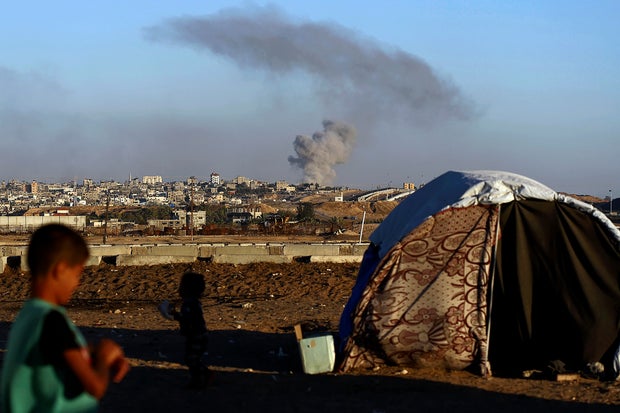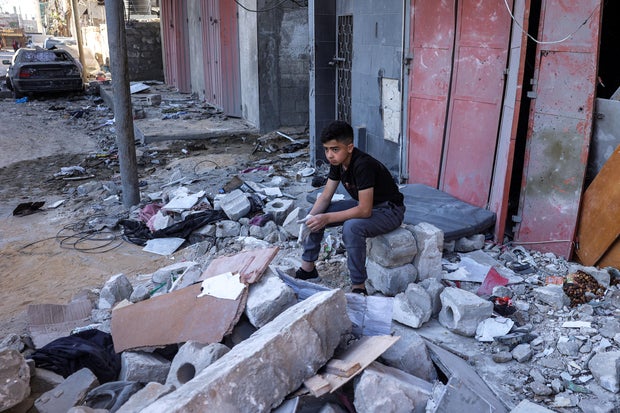
Jerusalem — The Israeli army announced Wednesday that it had reopened the Kerem Shalom crossing into Gaza, a key terminal for the entry of humanitarian aid that was closed this weekend after Hamas rocket attack killed four Israeli soldiers nearby.
An Israeli armored brigade seized the neighboring Rafah crossing point between Gaza and Egypt on Tuesday morning, and it remained closed, but the limited incursion does not appear to be the start of the full-scale invasion of the crowded southern city that Israel has repeatedly promised.
The impending operation threatens to widen the divide between Israel and its main donor, the United States, which says it is concerned about the fate of around 1.3 million Palestinians crowded into Rafah, most of whom fled the fighting elsewhere. Israel says Rafah is Hamas’ last bastion and that a broader offensive is needed to dismantle the group’s military and government capabilities.
Ramez Habboub/AP
A senior Biden administration official confirmed to CBS News on Tuesday evening that the United States suspended an arms shipment to Israel last week due to concerns about how the weapons could be used in the of a possible land operation in Rafah.
The White House’s position is that Israel “should not launch a major ground operation in Rafah,” the official said.
The interrupted shipment included 1,800 two-thousand-pound bombs and 1,700 five-hundred-pound bombs, the official said.
The official said the White House was “particularly focused” on the “end use” of the 2,000-pound bombs and the “impact” these bombs could have in “dense urban environments.”
“We have not made a final decision on how to proceed with this shipment,” and other shipments are under consideration, the official revealed.
The United States has consistently provided Israel with enormous amounts of military aid, which has only accelerated since the war began.
AFP via Getty Images
The United States, Egypt and Qatar, meanwhile, are stepping up efforts to fill gaps in a possible deal providing for at least a temporary ceasefire and the release of some of the many Israeli hostages still held by Hamas. Israel linked the threat of Operation Rafah to the fate of these negotiations.
Hamas said on Monday he had approved a ceasefire proposal presented by Egypt and Qatar, but Israel said what Hamas agreed to was “far from meeting Israel’s main demands.”
The Rafah crossing has been a vital conduit for humanitarian aid since the start of the war and is the only place where people can enter and exit. Israel now controls all Gaza border crossings for the first time since it withdrew its troops and settlers from the territory almost two decades ago, although it maintained a blockade with Egypt’s cooperation for most of that period.
Associated Press journalists heard sporadic explosions and gunfire in the Rafah crossing area overnight, including two large explosions Wednesday morning. The Israeli military reported six launches from Rafah to the Kerem Shalom crossing on Tuesday.
Gaza’s Hamas-run health ministry said at least 46 patients and wounded who were due to leave Tuesday to receive medical treatment were stranded.
U.N. agencies and aid groups have stepped up humanitarian aid in recent weeks, with Israel lifting some restrictions and opening an additional crossing into the north under pressure from the United States, its closest ally. But aid workers say closing Rafah, which is the only fuel gateway for trucks and generators, could have serious repercussions.
The UN says northern Gaza is already in a state of “widespread famine”.
The war began when Hamas militants breached Israeli defenses on October 7 and overran military bases and nearby farming communities, killing some 1,200 people, mostly civilians, and kidnapping 250 others. more than 30 others, most of the others having been released during the November ceasefire.
The war has killed more than 34,700 Palestinians, according to Gaza health officials, and driven about 80 percent of Gaza’s 2.3 million Palestinians from their homes. The Israeli military campaign was one of the deadliest and most destructive in recent history, reducing large parts of Gaza to rubble.
President Biden has repeatedly warned Israeli Prime Minister Benjamin Netanyahu against launching an invasion of Rafah. But Netanyahu’s far-right coalition partners have threatened to topple his government if he calls off an offensive or makes too many concessions in ceasefire talks.
Grub5






